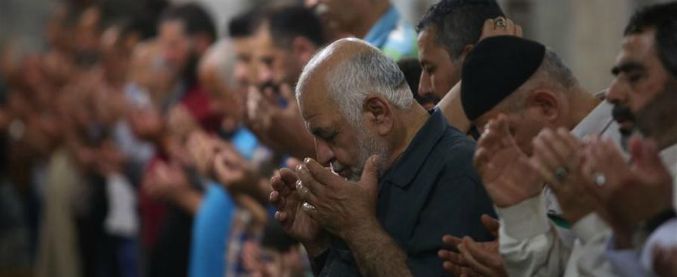Palestine: when the national identity is repressed, the religious one becomes invincible

In ten years, it’s been the first time.
In the last row of bus 218, the bus that shuttles back and forth between Ramallah and Jerusalem, three teenagers, three students with Nike sneakers and a backpack, started playing a guitar. Right away, a man told them to stop: the radio was broadcasting the Quran. It wasn’t prayer time: but he yelled that it was haram, prohibited. That it was an outrage. “And it isn’t over,” he said, as the boys placed the guitar back into its black case.
And all the other passengers just watched. And said nothing.
That dance music that everybody here listens to, on the other hand, sounds like an Arab Despacito only to foreigners who don’t understand the lyrics: it’s the Quran, actually. It’s the opening of the Quran. Repeated over and over again with an electronic arrangement.
The current Islamic revival is a complex phenomenon, sparked by several causes. And here, quite different than elsewhere. The two states sketched on the Oslo Accords maps have been basically submerged by the concrete flow of new settlements. Israel and Palestine are now one state, there is no point in denying it, they are Israel and nothing else: with an Arab minority. And since the national identity is harshly curbed, Palestinians turn to their religious identity. That Israel can’t attack. And that consequently, becomes stronger and stronger. Or perhaps, it’s always been strong, I don’t know. Perhaps, simply, Nine Eleven changed it all, slamming Islam in the headlines all over the world, in books, in TV shows, everywhere, and today Muslims are just more assertive. They just speak out more. Or perhaps we notice them more than before. I don’t know. But for sure I am in Nablus for a journalism conference now, I am with two Norwegians, and we have been assigned two translators: a female student for me and the other Norwegian female reporter, and a male student for the Norwegian male reporter. Only a coincidence, maybe. But it never happened to me. We have dinner in these homes where the wife cooks, and then disappears: not to stay with strangers. And at al-Najah, at the university, an Intifada stronghold, in the past, the conference started with the national anthem: and a long prayer.
I have been around the Middle East for ten years. And honestly, the Quran is the last thing I have read. Because I came here first, I came in Israel and Palestine: and the priority, here, is rather law. International law. It’s history, the struggle for the land. Not for God. The inner dynamics of the occupation. If you want to understand Israelis and Palestinians, the books of Ilan Pappé, of Jeff Halper, Neve Gordon, Sara Roy, are much more revealing than the Quran. But now, instead, here, too, even here, that’s what everybody talks about. Islam. This Islam that experienced in this way, it’s a sort of fast food, a McIslam that doesn’t call you to think, to question yourself, but quite the opposite, it provides easy and straightforward rules: it calls you to act instinctively.
It is something social, rather than religious, because Muslims or not, we know: especially in times of uncertainty, like ours, to obey is much easier than to choose. To conform. To belong. And instead of having doubts, ringing the hotline of some Gulf-based imam, and for a dollar, getting a fatwa that tells you what is just and what is not. That simplifies the world.
That tells you who is right and who is wrong.
Rather than a way to understand life, such an Islam is a way to escape it.
And it is an Islam that has nothing of Islam. Because Nablus, yes, has always been a conservative city. The first with an Hamas mayor. But now it has a new mosque: the Arafat Mosque. Which is somehow as if in Cuba a church were named after Fidel Castro.